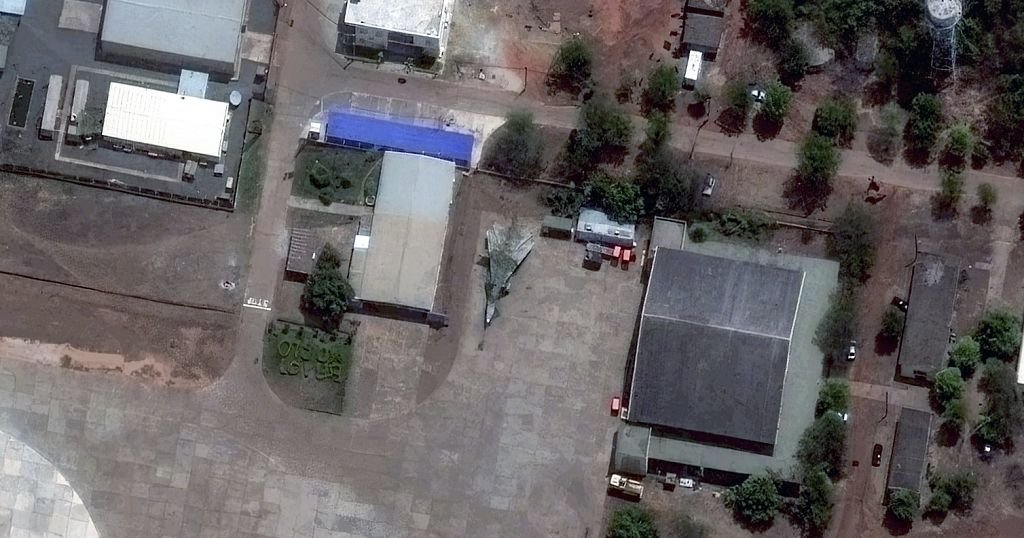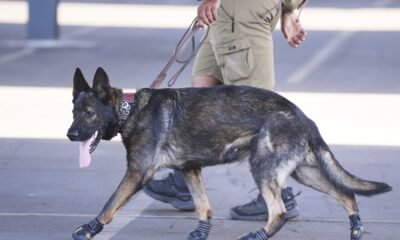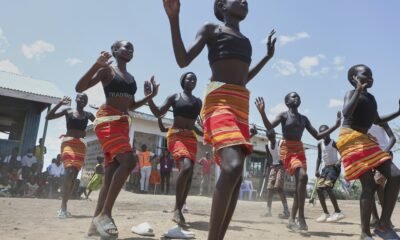Africa
Russia says it plans to boost economic and military cooperation with Africa

Russia is stepping up cooperation with African countries, including in defence and security, the Kremlin said on Monday.
“We really intend to comprehensively develop our interaction with African countries, focusing primarily on economic and investment interaction”, Kremlin spokesperson Dmitry Peskov said.
“This also corresponds to and extends to such sensitive areas as defence and security. In this regard, Russia will also continue interaction and cooperation with African states.”
Russia’s role in Africa’s security came under greater scrutiny after mercenary group Wagner announced last week it was leaving Mali.
Wagner had been deployed in Mali since December 2021 and had been repeatedly accused of human rights abuses.
Following Wagner’s failed mutiny in 2023, and the suspicious death of the group’s founder Yevgeny Prigozhin, Moscow restructured military operations in Africa and founded the Africa Corps.
The Kremlin-controlled paramilitary force will remain in Mali after Wagner’s departure.
“There is a void in the Sahel left by the departure of Western states, especially by the French, the United States, and other European countries”, said analyst Rida Lyammouri, from the Morocco-based Policy Center for the New South.
“So this is an opportunity for Russia that is going to cost them basically almost nothing. Not nothing, but it’s an easy win that it’s not going to require a lot of resources to be mobilized to exert that influence in the region.”
Governments in the Sahel region turned to Russian-controlled armed forces to help battle fighters linked with al-Qaeda and the Islamic State.
Armed groups in Mali have inflicted heavy losses on Malian troops and Russian mercenaries.
The al-Qaeda linked jihadist group Jama’at Nasr al-Islam wal-Muslimin (JNIM) killed dozens of soldiers in an attack on a military base this month. Militants also killed dozens of Wagner mercenaries in northern Mali last July.
“Russia’s presence through its mercenary group Wagner in Mali is different than its presence in Burkina Faso and Niger. In Mali, Wagner are fighting with the Malian military, side by side”, said Lyammouri.
“They have helped them to recapture northern regions from rebels groups, but at the same time they continue to struggle in [the] fight against JNIM and the Islamic State [in the Sahara] as we have seen in recent weeks with the repeated attacks in the different parts of the country.”
Despite Western sanctions, Russia is using cargo ships to send sophisticated weaponry to West African countries, including tanks, armored vehicles and artillery.
Satellites images reviewed by Associated Press found that ships carrying weapons docked and unloaded in Conakry, Guinea, in late May.
Russia and China are the top arms suppliers to the continent.
Africa
South Africa: At least 101 dead in Eastern Cape floods as rescue efforts continue

The official death toll in South Africa’s devastating floods remains unclear as rescue efforts for missing people continue in the Eastern Cape province.
Authorities said last week that 101 people had died but this number is likely to increase.
Victims include 38 children. The youngest fatality is an infant about 12 months old. Seven bodies remain unidentified and search operations are ongoing for two missing children.
The OR Tambo and Amathole districts were the hardest hit areas.
“This moment will be recorded among the most agonising chapters in our province’s history”, Eastern Cape provincial government official Zolile Williams said in a statement.
“While we have borne witness to tragedies that claimed the lives of our people before, this one resonates on a profoundly deeper level, it wounds the very foundation of our hearts.”
The Eastern Cape provincial government extended its condolences to the victims’ families.
Extreme weather hit the province between June 9 and 10. Heavy rain caused by a cold front turned into floods that swept away victims and their houses, trapped others in their homes, strongly damaged infrastructure and cut electricity supplies.
Electricity has been restored to over 80% of affected customers and more than 95% of the water supply having been restored in the OR Tambo and Amathole Districts, according to Williams.
Local authorities said an estimated R5.1 billion (about $290 million) would be needed to repair damaged infrastructure.
South Africa has declared a state of national disaster, allowing the government to release funding for relief services.
South African President Cyril Ramaphosa visited the worst affected sites on 13 June and blamed the heavy rains and catastrophic floods on climate change.
Climatic phenomena, such as the El Niño phase, caused “a series of extreme weather events” on the African continent last year, the World Meteorological Organization found in its 2024 State of the Climate in Africa report.
Another cold front hit South Africa’s Western Cape province last week, bringing days of rain and causing flooding in and around the city of Cape Town.
Africa
Report: US cuts to foreign aid could cause more than 14 million deaths by 2030

Donald Trump’s decision to drastically cut US humanitarian aid is expected to have disastrous consequences, researchers warn.
In a study published by the prestigious scientific journal “The Lancet,” they estimate that the collapse of US funding for international aid could lead to more than 14 million additional deaths by 2030.
According to their modeling, the 83% cut in US funding—a figure announced by the government in early 2025—could lead to more than 14 million additional deaths by 2030, including more than 4.5 million children under age 5, or about 700,000 additional child deaths per year.
Examining data from 133 countries, the international team of researchers estimated that USAID-funded programs prevented 91 million deaths in low- and middle-income countries between 2001 and 2021.
USAID-supported programs led to a 15% reduction in overall deaths, with a 32% decline in loss of life among children under 5, researchers found.
The biggest impact was seen in preventable diseases: HIV/AIDS mortality dropped by 74%, malaria by 53%, and neglected tropical diseases by 51% in countries receiving the most aid, compared to those with little or no USAID funding.
Africa
Detained Chadian opposition leader Succes Masra ends hunger strike

Chadian opposition leader and former Prime Minister Succès Masra, who has been in detention since mid-May, has ended his hunger strike after about a week of fasting, his lawyers announced Monday.
” President Masra, physically weakened but morally combative […] is suspending his food strike and will re-prepare for the rest of this procedure,” the group of lawyers defending him announced in a statement Monday evening.
” His doctor, who was able to visit his bedside and consult with him, strongly recommended that he suspend this difficult and painful decision, especially since the medication he must take requires it,” the statement read.
On Saturday, around twenty women from his opposition party, the Transformateurs, demonstrated in their undergarments in N’Djamena to demand the release of their leader.
Masra, arrested on May 16, announced his hunger strike last Tuesday in a letter made public by his lawyers. He is being prosecuted for ” incitement to hatred and revolt, formation and complicity of armed gangs, complicity in murder, arson, and desecration of graves .”
On May 14, 42 people, ” mostly women and children,” were killed in Mandakao, in the Logone-Occidental region (southwest Chad), according to the Chadian justice system, which accuses Masra of having provoked this massacre through one of his public statements.
Success Masra, originally from the south of the country, enjoys widespread popularity among the predominantly Christian and southern populations, who feel marginalized by the predominantly Muslim regime in N’Djamena.
-

 Europe4 days ago
Europe4 days agoShe threw three coins in the Trevi Fountain and fell in love
-

 Lifestyle5 days ago
Lifestyle5 days agoSniffer dogs at Club World Cup outfitted with booties to protect paws from the heat
-

 Lifestyle4 days ago
Lifestyle4 days agoWith ‘Nobu,’ famed chef serves miso cod with a side of inspiration
-

 Sports5 days ago
Sports5 days agoThe women surfing 50-foot waves: ‘I’ve almost died so many times’
-

 Europe4 days ago
Europe4 days agoDenmark plans to thwart deepfakers by giving everyone copyright over their own features
-

 Europe4 days ago
Europe4 days agoOslo police announce rape and sexual assault charges against son of Norwegian crown princess
-

 Lifestyle4 days ago
Lifestyle4 days agoJunya Watanabe’s rebellious dandies take over Paris Fashion Week
-

 Lifestyle5 days ago
Lifestyle5 days agoFusion between culture and modernity as children dance in Kenya’s refugee camp




